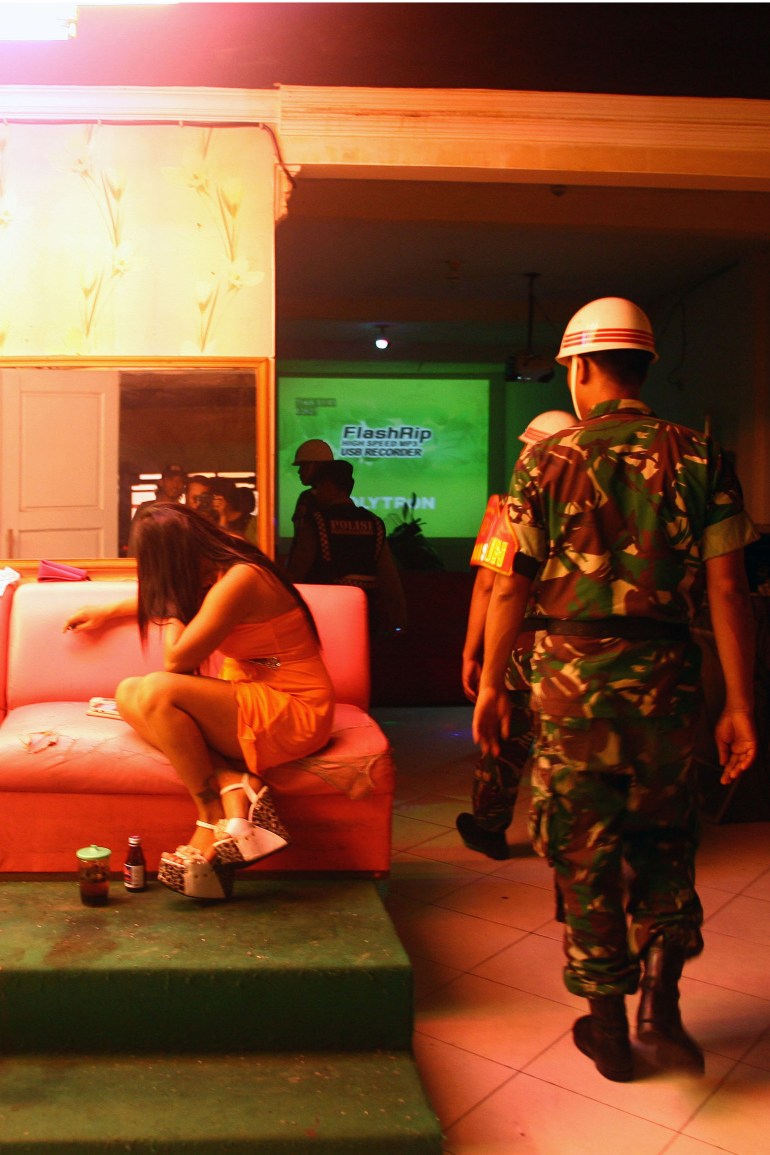Medan, Indonesia – Marta Dewi, a housewife in Central Java province, became an advocate for Indonesia’s sex workers by accident.
Dewi lives in Bandungan, a small mountain town known for drawing thousands of sex workers from all over Indonesia. Living side-by-side with the women trying to make a living, Dewi empathised with their situation.
“I’ve never worked as a sex worker but I care about my environment and, in my area, there are so many sex workers,” Dewi told Al Jazeera. “Once I got to know them, I realised that they did these jobs out of necessity and shouldn’t be judged.”
In 2015, Dewi founded PERKAWIS, or the Association of Tourist Workers, a union to support sex workers in the region and educate them about health, financial issues and the law. The name was chosen in consideration of the stigma associated with sex work and to sound palatable to religious groups in the region.
Dewi decided to set up PERKAWIS after a sex worker died of an overdose and was discovered in a boarding house close to Bandungan with only a fake identity card on them.
“It was so difficult for us because we couldn’t find their family,” Dewi recalled. “There were a number of other cases too, where a sex worker died and we had no data about them. Now we compile the data of the workers who come here so that we know who to contact if there is a problem.”
PERKAWIS also works with the local health authority to provide sex workers with health checks and educate them about their reproductive health as many of the women have not been taught basic sex education. The union has handed out free condoms in the past and provided workers with screenings for HIV and other STIs.
While sex work is not illegal in Indonesia, those working in the industry are often prosecuted under other laws such as the country’s anti-pornography legislation. In 2014, Semarang Regency, where Bandungan is located, passed legislation outlawing sex work, only to revoke it the following year and pass new legislation granting sex workers some rights, including protection from prosecution.
Yet Firhandika Ade Santury, a researcher from Bandungan who has spent several years documenting the industry, said sex workers are still not fully protected by the government.
“Indonesian society usually sees sex work in black-and-white terms. They see them as ‘bad’ and don’t consider them workers in the classic sense,” Santury told Al Jazeera. “I found that their job is a result of their situation, not their first choice of employment, so why do we blame them and not the economic issues that have caused their situation?”
According to Sanutry’s research, about 88 percent of sex workers in the region join the industry out of economic necessity.
“They face threats such as abuse, violence and health problems, and these are all issues which are not addressed,” he said. “They need a union because sex workers need support. We need to support their rights as workers.”

Another way in which Dewi’s union supports sex workers is by helping them plan for the future, something she said is important if they want to leave sex work one day.
“We talk about how much money they need to do something else, like open their own businesses, and they work towards that as a goal. If they don’t have anyone to do that with them, they can end up trapped in the industry for years.”
Leli, a coordinator for the Indonesian Organisation for Social Change (OPSI), a civil society group that supports sex workers, said there is an urgent need for sex workers in Indonesia to unionise as their livelihoods are so precarious due to factors outside their control.
Leli said the COVID-19 pandemic had been especially tough for sex workers, who do not receive benefits such as holiday pay, end-of-year bonuses or pensions.
The Muslim holy month of Ramadan can also be a struggle.
“On a normal day, it is difficult to find clients, let alone during Ramadan,” Leli, who is a former sex worker, told Al Jazeera.
“There are more raids during Ramadan but sex workers still have to provide for their families and, with the Eid holiday, they need to make and save even more money to pay for everything, while at the same time, there are fewer and fewer clients.”
Leli is originally from Langkat, a regency located a two hours drive from Medan. Like many other sex workers, Leli left her hometown to avoid the stigma of sex work. In Bandungan, sex workers typically come from neighbouring Cipara and Bandung, and sometimes even further-flung Kalimantan, to look for work.
Activists say the tendency of sex workers to move away from family and friends only adds to the need for groups like PERKAWIS that can offer support.
Dewi said PERKAWIS does not have a set number of members as the turnover of sex workers in the area is high, but that she typically has about 100 sex workers in her database at any given time.
“I just do as much as I can do, within the conditions that I have to work with,” she said. “I just try to care about the people around me.”
Sumber: www.aljazeera.com
 Skip to content
Skip to content


